- Home
- Ian Buruma
Inventing Japan: 1853-1964 (Modern Library Chronicles) Page 5
Inventing Japan: 1853-1964 (Modern Library Chronicles) Read online
Page 5
Most Japanese shared Fukuzawa’s patriotic view of the war. Cutting China down to size meant Japan had joined the great nations. It also gave Japanese a new sense of national unity. The emperor had moved with his government to the war headquarters in Hiroshima, as an example of what Fukuzawa described as a “perfect cooperation between the government and the people.” Newspapers reported the exploits of war heroes such as Shirakami Genjiro, the legendary bugler who kept on sounding the charge even after he had been shot through his lung. Current hit songs bore such titles as “The Dynamite Song” or “The Chinks.”
Lafcadio Hearn, living in Japan at the time, wrote that the “real birthday of New Japan—began with the conquest of China.” People felt that now, surely, the world—the Western world, that is—would take Japan seriously. A famous journalist wrote: “We are no longer ashamed to stand before the world as Japanese.” This encapsulated the dark side of Bunmei Kaika, the idea that colonial conquest was the ultimate sign of greatness and modernity. It is where the other Meiji slogan, “Rich Country, Strong Army,” kicked in.
Many, if not most, men of Meiji were heirs to such Edo intellectuals as Honda Toshiaki, who believed that no serious nation could be without an empire. The Sino-Japanese War was fought over supremacy in Korea, but its aims were wider than that. Even as he engaged in his dancing diplomacy, Foreign Minister Inoue Kaoru was keen to establish a Japanese empire in those parts of Asia that had not yet been taken by Western powers. The Japanese, as the great modernizers of Asia, set out to modernize the backward Koreans. When the Japanese took over Taiwan as a spoil of their victory, they vowed to make it into a model of enlightened colonialism. Japan, in the words of another flag-waving Japanese journalist, would finally be able to share with the Western powers in “this great and glorious work.” What had not been achieved through cultural mimicry in ballrooms and fancy clubs had been brought about by blood and iron. Japan was now a power of substance. Just before the Japanese army defeated the forces of imperial China, the unequal treaties with the West ended. And now that they had proven their military mettle, Japan was able to inflict similarly unequal treaties on China. The lesson learned from Commodore Perry had finally borne its dark fruit.
—
National unity, the Darwinian struggle for national survival, racial vigor: These were themes that played all over the late-nineteenth-century world. Everywhere, new nations were being created and new national identities defined. More or less violent debates on these issues raged within nations, but there were certain distinctly national flavors. French reactionaries still pined for the ancien régime, but the republican idea of nationhood had struck roots in France; citizenship was defined by political rights, not by race or creed. The same applied to British citizenship, even though Her Majesty’s subjects, unlike French citizens, owed allegiance to a monarchy that defended one faith. Germany, which became a unified state only in 1871, a mere three years after the Meiji Restoration, had problems defining its nationhood. Many Germans lived outside the national borders. The German states within wished to preserve their own identities. Like Meiji Japan, Wilhelminian Germany had to forge a centralized state out of old fiefdoms and feudal domains. What made a German feel German was something less political than cultural and ethnic, not citizenship so much as Kultur, music, poetry, and race; you belonged if your language was German and you were of German stock. Given the brittleness of German political institutions and the recent memories of revolution (in 1848), Bismarck and the Prussian monarchs were deeply suspicious of party politics. Party politicians, in their view, were “selfish,” and liberals were potential traitors. National unity, under the Prussian kaisers, would be imposed by military discipline and cultural propaganda about national essence and the German spirit. National strength would be forged in iron and fed with blood.
The Meiji oligarchs, despite some opposition even in their own ranks, chose to go the German route. This was partly because the oligarchs had come of age as warriors, for whom the notion of political liberalism or republicanism was alien. They knew that a constitution and the semblance of political representation were necessary accoutrements of a modern state. But they struggled to solve a problem that many Muslim states are still facing today. They wanted to be modern and invoke ancient traditions at the same time. This was achieved by grafting German dogmas onto Japanese myths. They shared the same mixture of military discipline, mystical monarchism, and blood-and-soil propaganda about national essences. The most influential architect of the new national order was not Ito Hirobumi, despite his Bismarckian mannerisms, or a ballroom dancer like Inoue Kaoru, but Ito’s old comrade in arms Yamagata Aritomo. He considered two things to be vital for national survival: military preparedness and education. And the kind of education he favored fostered loyalty, discipline, and obedience and squashed “selfish” individualism.
Like Ito, General Yamagata was born in Choshu, in 1839. His father was a samurai foot soldier. Again like Ito, he studied under Yoshida Shoin, the fierce nationalist who tried to get Commodore Perry to take him to America. Unlike the more affable Ito, however, Yamagata was a stern, unsmiling disciplinarian who left his mark on Japanese institutions as a military man, first as home affairs minister in the 1880s and twice as prime minister in the 1890s. He was the archetypical military bureaucrat, of whom there would be too many more.
To see Yamagata as a reactionary is to miss the point. He was not nostalgic for the days of the Edo bakufu. Indeed, he welcomed Japan’s transformation into a great modern state. Nor was he against using Western ideas. Like his teacher Yoshida Shoin, he was eager to learn from other countries and spent a year traveling around Europe just after the restoration. He even hired German jurists to draft Japanese laws. But he was always aware of the consequences of opening the country to modern influences. Access to new ideas might easily “confuse” people and make them rebellious. Western influences should not be allowed to undermine traditional values. Yamagata was home minister when the People’s Rights Movement was stirring up popular disobedience. He asked Ito, who was prime minister in the early 1880s, to introduce harsher legislation “to deal with political parties,” for otherwise “the goal of preserving the independence of our imperial nation” would be impossible.
Yamagata got his way. Restrictive laws did tie down party politics. But his most important legacy was the role of the Imperial Armed Forces. The idea of a national army of conscripts was revolutionary in a country where carrying arms had been the privilege of a military caste. Not only had samurai been the only Japanese entitled to bear swords (and commit ritual suicide), but they had owed their loyalty to the lords of their domains, not to a central government. No wonder, then, that many ex-samurai resisted such a radical innovation. But not Yamagata, who was a modernist in this respect. From 1873, all able-bodied Japanese men had to serve three years in the army and four years in the reserves. For most of them, this was their first taste of Westernization. They wore Western-style uniforms, lived in Western-style barracks, and learned about Western military technology. Many also learned to read and write. And what they read was mostly nationalist propaganda. The armed forces, and not Fukuzawa’s academy or free speech societies, were the conduit for modernity for most young men in Meiji Japan.
Even as modern technology and Western ways became familiar to millions of men, old samurai ethics spread their way through all classes of Meiji society. This was a deliberate policy. To Yamagata and other like-minded military men, the conscript army was not only essential to defend the country against foreign enemies, but the best way to unify the nation. National unity was armed unity. National education was military education. The samurai virtues were now applied nationally. Loyalty and obedience to the emperor, who was paraded around the country in military uniform, was the highest form of patriotism.
In 1882, the emperor handed down a Rescript for Soldiers and Sailors, drafted by Yamagata. It was one of the most influential documents in modern Japanese history. The rescript spelled out th
e duties that every Japanese soldier and sailor had to learn by rote. Absolute loyalty was due only to the emperor: “We are your supreme Commander-in-Chief. Our relations with you will be most intimate when We rely on you as Our limbs and you look up to Us as your head.” The emperor’s troops were to refrain from politics. They were not to question imperial policies or even voice private opinions about them. Yamagata’s aim was to remove the armed forces from politics, to lift them to a higher sphere where the only thing that mattered was the imperial will. He thought this would prevent rebellions. The flaw in this scheme would become obvious half a century later. For it often had the opposite effect. If a soldier’s only duty was to the divine monarch, then it surely was legitimate to rebel against civilian leaders who were thought to ignore the imperial will. This was precisely what the sincerely fascistic young army officers thought in 1936, when they went around murdering cabinet ministers to show their loyalty to the throne.
Emperor worship, one of the pillars of Yamagata’s new order, was presented as an ancient duty, as something inherent to the Japanese psyche, as the essence of Japanese Kultur reaching back to the birth of the first Shinto gods. In fact this was as phony as the Gothic inventions in Wilhelminian Germany. Like German romantic medievalism, it borrowed elements from the past, to be sure, but the emperor cult that evolved in the Meiji era was as modern as Yamagata’s conscript army. Japanese had never actually worshiped the emperor as the supreme deity before. Until the last years of the Edo period, he had lived in Kyoto, cultivating the arts, as a spiritual guardian of Japanese customs and morals. Shinto was not a state religion or cult, but a loose collection of animist rituals and seasonal feasts, celebrating nature, fertility, and gods who gave birth to Japan. In the Meiji period, however, Shinto gradually became state Shinto, a very different thing. What Yamagata and other Meiji oligarchs did was to politicize culture and religion, while neutralizing secular political institutions. Nationhood, despite the constitution, was based not on political rights, but on religious worship of the imperial institution and, through state Shinto, the idea of Japan itself.
The Imperial Rescript on Education, handed down in 1890, when Yamagata was still prime minister, told the Japanese people to be obedient to the emperor and his divine ancestors. In loyalty and filial piety, it said, lay the “glory of the fundamental character of Our Empire” and the “source of Our education.” This was a reaction to the kind of Westernization promoted by such people as Fukuzawa Yukichi. Conservatives were convinced that the process of Westernization had gone too far and threatened the moral standards of the empire.
The notion was in fact profoundly Confucian. Despite all their kicking against Chinese influences and all their mystical talk of deep Japaneseness, Japanese authorities were still steeped in neo-Confucian ways of thinking. The idea that common people are to be controlled through moral exhortation and enforced intellectual conformity is Chinese in origin. Constitutionally, there may have been freedom of religion in Japan, but in fact there was little room for dissent, for the source of power remained the source of truth. Aside from the Buddhists, Japanese Christians got the full blast of nativist propaganda. They were tolerated at first. Some of the most famous Meiji intellectuals were Christians. But after the rescript, life became increasingly difficult, for you could not worship two gods. If Japanese Christians wanted to be assimilated to the national polity of Japan, opined a well-known Meiji professor, Christianity would have to be completely destroyed, for sovereignty in Japan was vested in a single “race-father.”
The idea of an imperial God who was also commander in chief of the armed forces was already a radical departure from Japanese tradition. The idea that he was a race-father—indeed, the very thought of a national “race”—smacked of modern German-style ethnic nationalism, mixed up with nativist doctrines of the mid-nineteenth-century Mito School. It would be quite wrong, then, to see Yamagata’s authoritarian reaction to “Civilization and Enlightenment” as a break with modernity or Westernization. He, too, had borrowed ideas from the West. They just happened to be highly illiberal ones. The type of Japanese to emerge from his kind of education was far from Fukuzawa’s ideal. Instead of skeptical individualists, Japanese military training, in schools as well as the barracks, was bent on creating well-drilled conformists, singularly ill equipped to think for themselves.
—
The high point of Meiji militarism was the brutal war against Russia, which began with a Pearl Harbor–type raid on the Russian fleet in 1904. The Japanese were still feeling bruised because Western powers forced them to hand over some of their victory spoils in 1895. This included the southern tip of the Liaotung peninsula in Manchuria, which was then leased to the Russians. Western powers were feasting on Chinese territory just then: Germans in Shandong, the French in Canton, the British in various treaty ports along the coast. The Americans were expanding their Asian empire in the Pacific. The Russians acquired railway concessions in Manchuria and were moving into north Korea, which Japan saw as its turf. So the Japanese had ample reason to feel left out of the party.
The only consolation for Japan was its alliance with Britain in 1902. The German kaiser, Wilhelm II, loathed the Japanese despite their Germanophilia, and he frequently warned the czar of the “yellow peril.” The Russians brushed off Japanese attempts to discuss their respective interests in northeast Asia. So the Japanese navy, under Admiral Togo Heihachiro, struck hard, first at Port Arthur and later in the Tsushima Strait, after which there was nothing much left of Russia’s mighty Baltic fleet. Like the Americans some four decades later, the Russians were utterly unprepared. They never thought the Japanese would dare attack a major Western power. Such a thing was unheard of, at least since the days of Genghis Khan. The British press, on the other hand, was full of admiration for the “plucky little Japs.”
After one year of war, hundreds of thousands of Japanese and Russians had died in some of the most savage battles ever seen. The Russo-Japanese War was a kind of dress rehearsal for World War I. Gone were the brave buglers and colorful banners of the Sino-Japanese conflict. This time, two great armies slaughtered each other from barbed-wired trenches. To gain a few yards in muddy, rain-soaked terrain, thousands of men staggered into mine fields and machine-gun fire. In the battle for Port Arthur, General Nogi Maresuke’s army suffered fifty-eight thousand casualties, dead and wounded. One of the dead was his son. But Nogi, the paragon of Meiji patriotism, claimed this filled him with nothing but pride. At Mukden, the Russians suffered eighty-five thousand casualties and the Japanese seventy thousand. But after all that, Japan did get the Manchurian railway rights and the lease of the Liaotung peninsula. One of the foreign observers in this ghastly conflict was a young American lieutenant named Douglas MacArthur.
The victory mood in Tokyo was no longer as festive as in 1895, perhaps because too many people had died. The war songs were melancholy more than triumphant. The state had only just been saved from bankruptcy when Jacob Schiff, a Jewish banker in New York who was outraged by Russian pogroms, decided to come to Japan’s rescue. This strengthened Japanese credulity when captured Russian officers introduced them to anti-Semitic tracts about the supposed omnipotence of the Elders of Zion. Schiff, it seemed clear, was one of the Jews who secretly ruled the world: yet another wrong lesson picked up from the West. In some instances, the mood in Japan turned positively ugly. Enraged nationalists, but also members of the People’s Rights Movement, rioted in Tokyo because Russia had not been pressed to pay war reparations. A new generation, fed less on the idealism of the early restoration than on the hysterical chauvinism of the latter, more bellicose period, began to make itself felt. The oligarchs were passing from the scene. Yamagata, who had always been in favor of fostering a military but not a militant spirit, worried that future conflicts would be race wars between West and East.
—
Natsume Soseki, the most brilliant novelist of his time, warned darkly that Japan had tried to digest Western civilization too quickly and
was heading for a collective nervous breakdown. With Fukuzawa Yukichi, Soseki represented the best of Meiji. A man of real civilization and enlightenment, he exhibited a knowledge of Chinese, Japanese, and European literary culture that was rare in his time and almost unheard of today. Soseki was a humane, independent-minded, tortured writer. Kokoro, perhaps his finest novel, reflects all these qualities. It is the story of a relationship between a student and an older intellectual, known to his pupil simply as sensei, “Master.” They belong to different generations, master and pupil, divided by growing up in different times, different worlds. Master is tormented by a sense of guilt over his role in the youthful suicide of his best friend. He suffers also from a sense of isolation, of being an anachronism. When the Meiji emperor dies in the summer of 1912, he feels that his age has passed. He reads in the paper that General Nogi, hero of the Russo-Japanese War, committed suicide on the day of his emperor’s death. To die in this manner for one’s lord was already an anachronism a century before. Master, too, decides to kill himself.

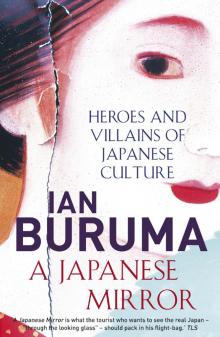 A Japanese Mirror
A Japanese Mirror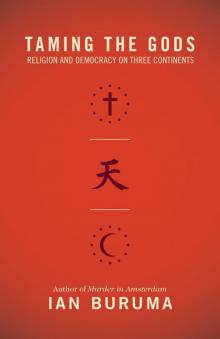 Taming the Gods
Taming the Gods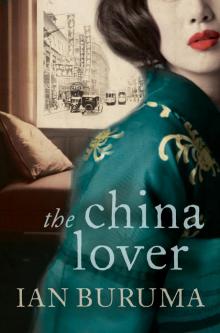 The China Lover
The China Lover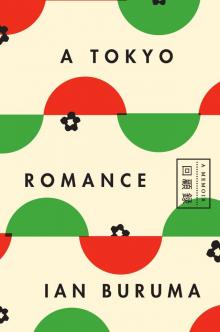 A Tokyo Romance
A Tokyo Romance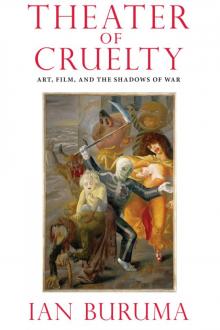 Theater of Cruelty
Theater of Cruelty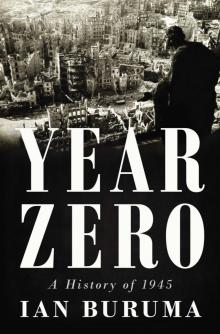 Year Zero
Year Zero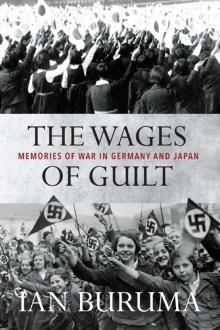 The Wages of Guilt
The Wages of Guilt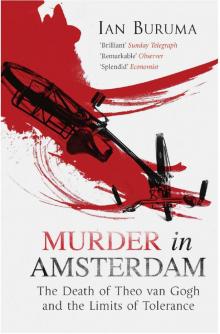 Murder in Amsterdam
Murder in Amsterdam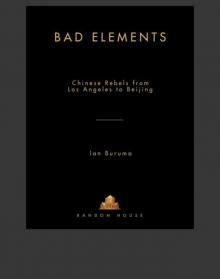 Bad Elements
Bad Elements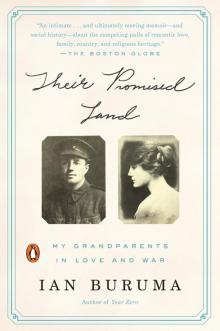 Their Promised Land
Their Promised Land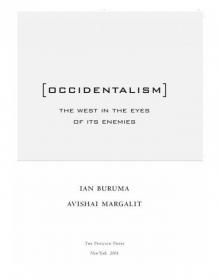 Occidentalism
Occidentalism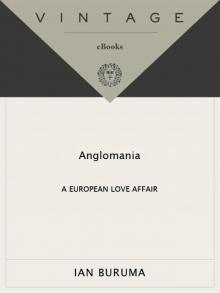 Anglomania
Anglomania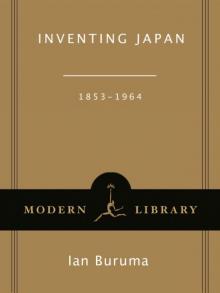 Inventing Japan: 1853-1964 (Modern Library Chronicles)
Inventing Japan: 1853-1964 (Modern Library Chronicles)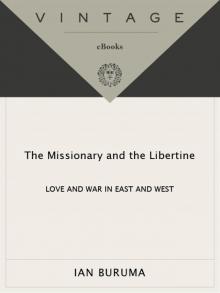 The Missionary and the Libertine
The Missionary and the Libertine